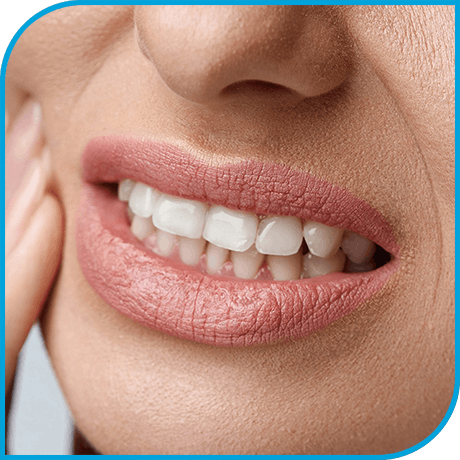WHY DO MY TEETH HURT?1
There are lots of reasons your teeth might hurt, but one of the common is tooth sensitivity.2 If you’ve ever winced after an unwelcome twinge of sharp sensation when you eat or drink something cold or hot, sweet or sour, this could be one of the symptoms of tooth sensitivity.
To find out what’s causing your tooth pain you should visit your dentist for a check-up and ask about tooth sensitivity. Your dentist will be able to identify the cause of your tooth sensitivity symptoms and rule out any of the other causes of tooth pain such as tooth decay, infection, disease or injury.
Here you can find out about the reasons why your teeth might hurt and learn about sensitive teeth symptoms.

DO I HAVE SENSITIVE TEETH?
If you feel a short, sharp twinge when you eat or drink something cold, hot, sweet or sour, or if you feel any discomfort when you brush your teeth, then you could have sensitive teeth, but there are other reasons why your teeth might hurt. You can take our Online Test to learn about the symptoms of sensitive teeth. If you are experiencing tooth sensitivity you should visit your dentist to find out what’s causing it and to discuss whether your symptoms could mean you have sensitive teeth.
DO I HAVE A CAVITY OR SENSITIVE TEETH?
Cavities are the result of tooth decay, and the sensations they cause can feel like tooth sensitivity – but they are different. Tooth decay happens when the sugars in food and drink react with plaque (a sticky, colourless film of bacteria that builds up on your teeth)3 to produce acids. These acids can gradually soften and dissolve your enamel and dentine (the soft substance inside your tooth) creating a hole in the tooth – known as a cavity.
The pain from a cavity tends to be a dull ache that may be triggered by eating or biting down on something and may resemble sensitivity, which is often caused by cold or hot food and drink.4
If your teeth hurt you should always consult your dentist, but regular check ups are the best way to take good care of your teeth all the time. This is particularly important as you may not feel any pain from tooth decay until it’s quite advanced. Your dentist will be able to tell if you have a cavity or sensitive teeth and offer appropriate treatment and advice for both.
In order to manage tooth sensitivity and prevent tooth decay brush twice daily with a desensitizing toothpaste like Sensodyne, which is clinically proven to relieve tooth sensitivity with the additional benefit of having fluoride to prevent cavities.*
OTHER REASONS FOR TOOTH DISCOMFORT
Besides sensitivity and tooth decay there are other reasons your teeth may hurt. But, remember, if you’re experiencing any discomfort with your teeth you should visit your dentist to find out what’s causing it and get the right treatment.
- Dental treatment – You may feel sensitivity for a while after dental treatments, if this pain doesn’t go away you should speak to your dentist.5
- Tooth Whitening – You may experience tooth sensitivity after whitening treatments, which may be temporary. If tooth sensitivity persists get professional advice.6
- Tooth Infection – The soft pulp inside the tooth can become infected which can be very painful, causing intense throbbing pain and tooth sensitivity. Speak to your dentist immediately as the infection can spread.7
- Cracked tooth pain – A cracked or chipped tooth can cause pain if the dentine inside your tooth becomes exposed. If you experience tooth pain you should visit your dentist to get professional advice on treatment.8
The best way to prevent tooth pain is to follow a good oral hygiene routine and visit your dentist regularly. You should brush twice daily with a fluoride toothpaste. The Sensodyne range contains daily toothpastes, with fluoride, to meet different needs of your oral hygiene routine.
*When used as directed on pack.
1Addy, M, Smith S R. Dentin hypersensitivity: an overview on which to base tubule occlusion as a management concept. J Clin Dent 2010; 21(2) [Spec Iss]: 25-30.
2Addy M. Dentine Hypersensitivity. In: Addy M, Embery G, Edgar M, Orchardson R, editors. Tooth Wear and Sensitivity. London: Martin Dunitz; 2000. p239-248.
3Cavity or Sensitive Teeth: What’s The Difference? | Sensodyne. 2018. Cavity or Sensitive Teeth: What’s The Difference? | Sensodyne. [ONLINE] Available at: https://us.sensodyne.com/news/cavity-or-sensitive-teeth/. [Accessed 08 November 2019].
4WebMD. 2018. Tooth Pain: Common Causes and Treatment. [ONLINE] Available at: https://www.webmd.com/oral-health/why-teeth-hurt#1. [Accessed 08 November 2019].
5Berry, Jennifer - Why does my tooth still hurt after a filling? Reviewed by Christine Frank, DDS on 24 January 2019. https://www.medicalnewstoday.com/articles/324267.php
6ADA Council on Scientific Affairs. 2010. Tooth Whitening/Bleaching: Treatment Considerations for Dentists and Their Patients. [ONLINE] Available at: https://www.ada.org/~/media/ADA/About%20the%20ADA/Files/ada_house_of_delegates_whitening_report.ashx.
7NHS.UK. 2018. Dental Abscess - NHS.UK. [ONLINE] Available at: https://www.nhs.uk/conditions/Dental-abscess/. [Accessed 08 November 2019].
8WebMD. 2018. Tooth Pain: Common Causes and Treatment. [ONLINE] Available at: https://www.webmd.com/oral-health/why-teeth-hurt#1. [Accessed 08 November 2019].




















































